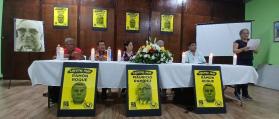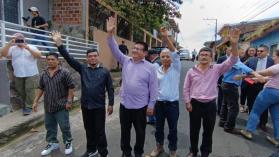Threat of Metal Mining Returns to El Salvador, Organizations Warn
The National Roundtable against Metallic Mining in El Salvador, a coalition of environmental and social movement organizations, universities, water justice activists, faith communities, human rights defenders, and others, issued a warning last week regarding the intention of the Bukele administration to permit metal mining in El Salvador, reversing the ban passed unanimously in 2017.
As background, in 2017, El Salvador became the first country in the world to pass a total ban on metal mining. The historic legislation was the achievement of over a decade of community organizing and education, led principally by rural women, and came at the cost of violent harassment, threats, and even the assassination of community leaders involved in the struggle.
Four years later, under the Bukele administration, environmental and social movement organizations are again on alert over the possible return of metal mining in El Salvador. “We are not being alarmists," said Omar Serrano from the Universidad Centroamericana José Simeón Cañas (UCA). "There are signs indicating that [the administration] is thinking of returning to mining, even if they do not say so publicly.”
These signs include the fact that in early December of this year, Bukele administration officials met with representatives from the "Intergovernmental Forum on Mining, Minerals, Metals and Development” (IGF), a Canadian organization that supports and promotes mining among its 78 member nations, or, as Pedro Cabezas from the Central American Alliance Against Mining (ACAFREMIN) characterizes it, a “front” organization for the mining industry, which brings together most of the mining transnationals throughout the world.
The meetings took place between IGF representatives and officials from across Bukele’s cabinet, including officials from the ministries of the environment, economy, public works, finance, and foreign relations. Even more concerning, El Salvador joined the IGF as a member nation in May of 2021, although the administration did not reveal this information until six months later, just before the IGF visits.
Further, on October 26 the Legislative Assembly passed a law establishing the "General Directorate of Energy, Hydrocarbons and Mines" whose purpose is to “authorize, regulate, and supervise the operation of mining activities.” The law likewise grants the directorate power to “establish, maintain, and promote cooperative relations with foreign and multilateral institutions or organizations linked to the mining sector.”
In a statement issued last week, the anti-mining roundtable organizations warned that these new policies are clear indications that the mining ban is at risk. Compounding the risk is the fact that reversing the ban in the Legislative Assembly would require only a simple majority, which Bukele’s New Ideas party firmly holds.
Even before the renewed threat of mining, social movement organizations have repeatedly denounced the Bukele administration for showing little interest in environmental issues. Within months of taking power, the government began granting permits for construction and other megaprojects at an unprecedented rate. More recently, the administration refused to sign the Escazú accords, which would protect environmental defenders and facilitate access to environmental information; and over the last year has pushed a corporate-friendly water bill despite wide opposition from the social movement, among other disturbing trends.
But reversing the mining ban would represent an even greater catastrophic risk, organizations say. “Allowing mining in the country would be the 'coup de grace' for the population, due to the water crisis and the environmental deterioration that it entails," says the UCA's Serrano. Likewise, a representative from the office of the Human Rights Ombudsman has indicated that, “Trying to reactivate mining would be an absolute setback in El Salvador, which waged years of struggle for the law prohibiting mental mining to be approved. On the contrary, we should be thinking about how to solve the ravages left by this extractivist process.”
As laid out in a recent editorial by El Faro, the central issue in the debate on metal mining in El Salvador has always been water. “Metal mining is a threat to water due to the enormous consumption and contamination with toxic materials, such as cyanide (a chemical that can kill a human being in quantities less than a grain of rice), mercury, sulfuric acid, hydrochloric acid, lead, arsenic, cadmium, magnesium and other substances. According to an Oxfam America study, Dirty Metals, 'When it comes to toxic emissions, metal mining is one of the leading industries.'"
Another issue highlighted by the roundtable organizations is the threat of social-environmental conflicts posed by extractivist projects such as those being developed in other Central American countries. ACAFREMIN's Cabezas, believes that the conflicts in neighboring nations should serve as a mirror for El Salvador's authorities. In Guatemala, for example, Indigenous communities from the Maya Q’eqchi Nation, journalists, and organizations are under attack from state policy and military forces for protecting their water, air, land, and sovereignty from corporations that seek to exploit the Fenix nickel mine. "The question we must ask ourselves is if we want to have these conditions in El Salvador," Cabezas said.
The roundtable organizations urge the Legislative Assembly not to reverse the ban approved by unanimous consensus in 2017 and call on the Bukele administration to not consider this activity as an economic alternative, given the severe impacts it could have on life, health, and stability throughout the country.

 "I am a CISPES supporter because continuing to fight for social justice and a more people-centered country means continuing the dream and sacrifice of thousands of my fellow Salvadorans who died for that vision.” - Padre Carlos, New York City
"I am a CISPES supporter because continuing to fight for social justice and a more people-centered country means continuing the dream and sacrifice of thousands of my fellow Salvadorans who died for that vision.” - Padre Carlos, New York City

